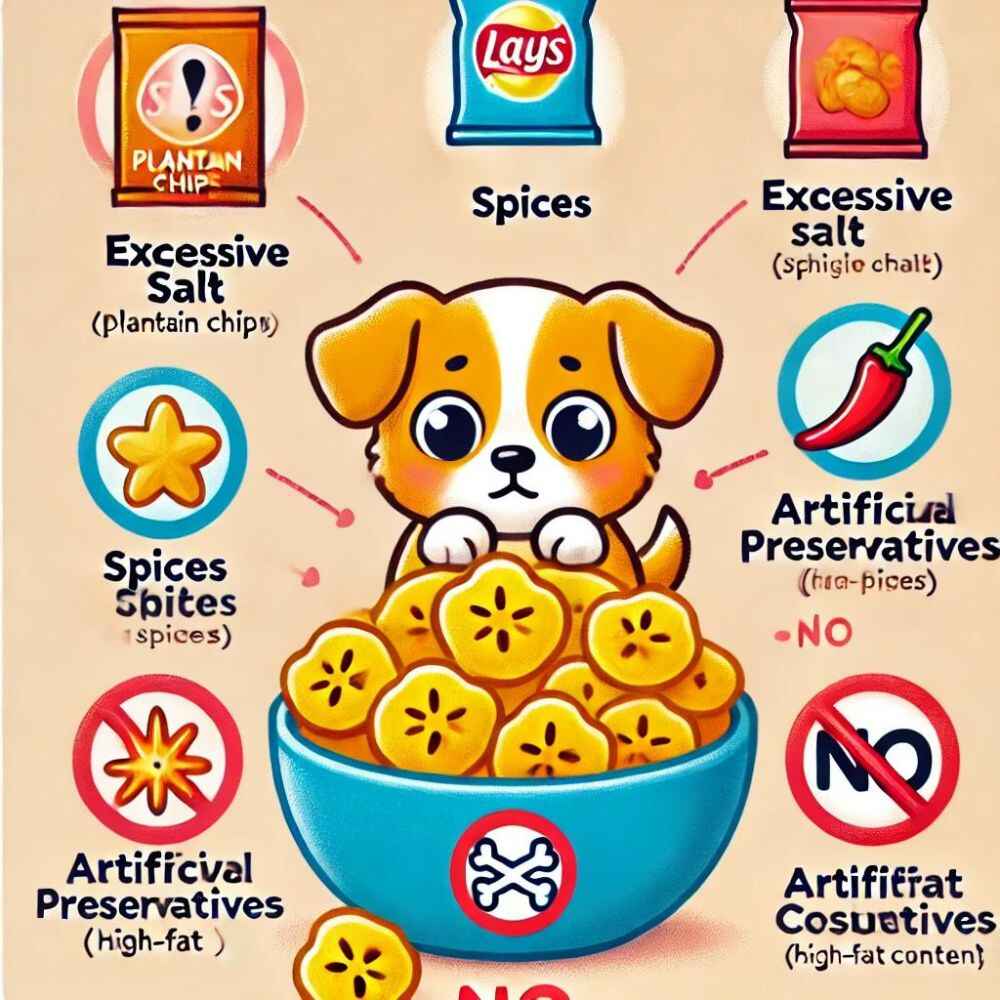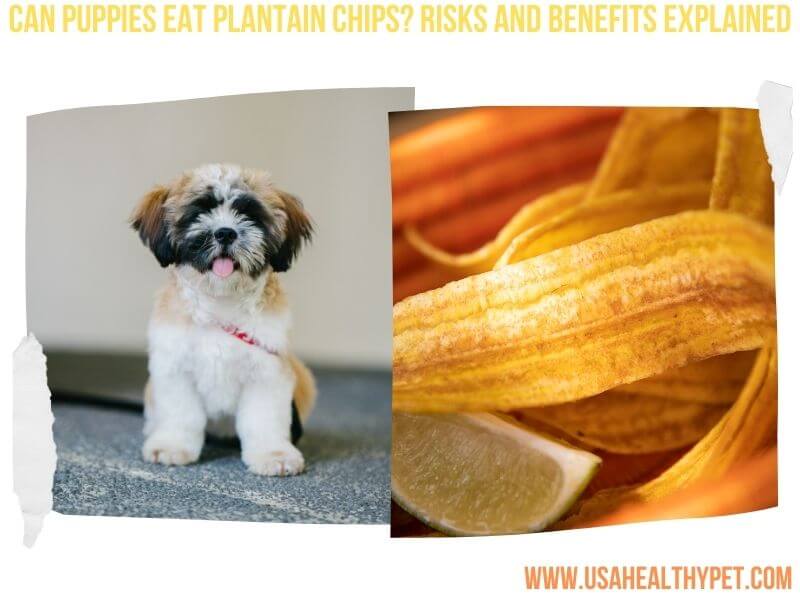Wondering if your puppy can nibble on plantain chips? It’s a common question for pet parents.
But before you share your snacks, let’s see what the experts have to say about this crispy treat and whether it’s suitable for your furry friend.
Key Points:
- Plantain chips are not safe for puppies due to high fat, salt, and harmful additives.
- Excessive salt can cause sodium poisoning, leading to vomiting, diarrhea, or seizures.
- Plain, cooked plantains (without seasoning) are a safer, occasional treat.
- Healthier alternatives include carrots, apples (seedless), and homemade dog treats.
- If consumed accidentally, monitor for symptoms and consult a vet if necessary.
What Are Plantain Chips?
Plantain chips are crispy snacks made from thinly sliced plantains that are fried or baked until golden brown.
They’re popular in many cultures, often enjoyed with a sprinkle of salt or a dash of seasoning.
Nutritional Profile of Plantain Chips
Before deciding if plantain chips are suitable for your puppy, it’s essential to understand what’s in them.
Plantain chips are high in carbohydrates, fats (due to frying), and often contain added salt and preservatives. While they might be a tasty treat for humans, the story is different when it comes to our four-legged friends.
Can Puppies Eat Plantain Chips? A Simple Answer
The short answer? No, puppies should not eat plantain chips. While a small bite may not cause immediate harm, regularly feeding plantain chips to your puppy is not a good idea.
Let’s explore the reasons in more detail.
Why Plantain Chips Are Not Ideal for Puppies

High Fat and Oil Content
Most plantain chips are fried in oil, which means they’re loaded with fat. Puppies have sensitive tummies, and consuming high-fat foods can lead to digestive upset.
Too much fat can cause diarrhea, vomiting, and in severe cases, pancreatitis – a painful and potentially life-threatening condition.
Sodium Levels: A Concern for Puppies
Plantain chips often come with a hefty dose of salt to enhance flavor. Unfortunately, too much salt can be dangerous for puppies.
The American Kennel Club (AKC) warns that “too much salt can lead to sodium ion poisoning in dogs, causing symptoms like vomiting, diarrhea, tremors, or even seizures.” Puppies, due to their small size, are particularly susceptible to these dangers.
The presence of Artificial Additives and Preservatives
Many commercially available plantain chips contain artificial flavors, preservatives, and other additives that could be harmful to your puppy.
Puppies are not built to handle these chemicals, which can cause allergies, skin irritations, or digestive issues.
Potential Health Risks of Feeding Plantain Chips to Puppies
Feeding plantain chips to your puppy can lead to several health issues:
Digestive Upsets and Gastrointestinal Issues
Plantain chips, being high in fat and difficult to digest, can cause stomach discomfort.
Dr. Remillard notes that “the fats and oils used in frying plantains are particularly tough on a puppy’s digestive system, leading to symptoms like bloating, gas, and diarrhea.”
Pancreatitis and Obesity Concerns
A diet high in fat can increase the risk of pancreatitis – inflammation of the pancreas that can be very painful and sometimes fatal.
Additionally, frequent consumption of high-calorie snacks like plantain chips can contribute to obesity, leading to long-term health problems.
Salt Poisoning in Puppies
Salt poisoning is a real danger if your puppy consumes too much sodium. Symptoms include vomiting, diarrhea, lethargy, and in severe cases, tremors or seizures.

Can Puppies Eat Raw or Cooked Plantains?
Unlike plantain chips, raw or cooked plain plantains (with no added salt, oil, or seasoning) are not inherently harmful to puppies. However, they should still be offered in moderation.
Cooking plantains without oil or seasoning can make them easier for your puppy to digest, and they contain some vitamins and minerals beneficial to their health.
Benefits of Plantains for Puppies (When Prepared Correctly)
While plantain chips are off the table, plain plantains do have some health benefits for your puppy.
Rich in Fiber and Essential Vitamins
Plantains are packed with fiber, which can support healthy digestion in your puppy.
They also contain vitamins A, C, and B6, which are good for your puppy’s skin, coat, and overall immune system.
Dr. Remillard mentions, “Fiber is important for maintaining healthy digestion, but too much can cause digestive upset, so moderation is key.
Promotes Healthy Digestion
Fiber in plantains helps keep your puppy’s digestive tract moving smoothly, reducing the risk of constipation or other digestive issues.
However, moderation is key – too much fiber can also lead to digestive problems!
Safe Ways to Serve Plantains to Your Puppy
If you’re considering adding plantains to your puppy’s diet, here’s the best way to do it:
- Boil or bake the plantains without adding any salt, sugar, or oil.
- Cut them into small, bite-sized pieces to avoid choking hazards.
- Introduce them slowly into your puppy’s diet to watch for any adverse reactions.

Healthy Alternatives to Plantain Chips for Puppies
Looking for puppy-friendly snacks? Here are some alternatives:
Homemade Dog Treats
Consider making homemade dog treats using puppy-safe ingredients like sweet potatoes, carrots, or pumpkin. These treats can be baked into crunchy snacks your puppy will love.
Vegetables and Fruits Safe for Puppies
Carrots, apples (without seeds), and cucumbers make great healthy snacks for puppies. They are low in calories and packed with vitamins.
Store-Bought Treats with Limited Ingredients
Opt for store-bought treats specifically designed for puppies. Look for treats with limited, natural ingredients and without artificial additives.
Signs Your Puppy Has Eaten Something They Shouldn’t Have
Watch for signs like vomiting, diarrhea, excessive drooling, restlessness, or lethargy. These could be indications that your puppy has ingested something harmful.
According to the Pet Poison Helpline, “The symptoms like vomiting, diarrhea could mean that your pet has ingested something harmful and needs immediate veterinary attention.”
What to Do if Your Puppy Eats Plantain Chips Accidentally
If your puppy has accidentally eaten plantain chips, don’t panic. Monitor them closely for any signs of discomfort or unusual behavior.
If they show any symptoms like vomiting, diarrhea, or lethargy, contact your vet immediately.
The AKC suggests, “Always consult your vet if you suspect your dog has eaten something they shouldn’t have.”
Tips for Maintaining a Puppy-Friendly Diet
To keep your puppy healthy, stick to a balanced diet formulated specifically for their nutritional needs. Avoid giving them human snacks, especially those high in fat, salt, or artificial ingredients.
Conclusion: Making Informed Choices for Your Puppy’s Health
While it might be tempting to share your favorite plantain chips with your puppy, it’s best to avoid it.
Puppies thrive on a diet tailored to their needs, and snacks like plantain chips can do more harm than good. Look for healthier alternatives and always keep your puppy’s best interests at heart.
Ready to make smarter snack choices for your furry friend? Start by swapping out those chips for some healthy, puppy-friendly treats!
FAQs
- Can puppies eat plantain chips occasionally?
It’s best to avoid giving your puppy plantain chips, even occasionally, due to the high fat and salt content. - Are plain plantains safe for puppies?
Yes, plain, cooked plantains can be safe in moderation, but avoid adding any salt, sugar, or spices. - What should I do if my puppy eats a lot of plantain chips?
Monitor your puppy for symptoms like vomiting or diarrhea and contact your vet if they show any signs of distress. - Can plantains be part of a healthy diet for puppies?
Plantains can be included in small amounts as long as they are prepared without oil, salt, or other harmful additives. - What are other healthy snacks for puppies?
Carrots, apples (without seeds), and specially formulated puppy treats are excellent alternatives to plantain chips.

Pingback: How Many Puppies Can a Pug Have? Explaining Pug Litters
Pingback: Can Dogs Eat Lemon Pepper? Expert Advice & Safe Alternatives